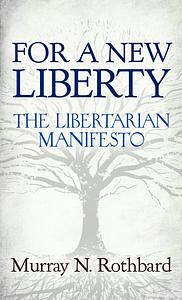Take a photo of a barcode or cover
Lectura muy recomendable. Aunque a veces un poco utópico. Quizás su optimismo por el crecimiento de las ideas pro-libertad se debió al colapso de la URSS, pero está claro que por mucho que haya fracasado el estatismo en todas partes, está claro que sigue teniendo arrastre entre la gente gracias a políticas populistas.
Basta ver como estamos a punto de aprobar una constitución que pone al estado por sobre todo.
Basta ver como estamos a punto de aprobar una constitución que pone al estado por sobre todo.
A great read. Rothbard's depth and breadth of historical knowledge is impressive. Reminded me a lot of "The Market for Liberty" by the Tannehills. I wonder which was written first.
This is the second or third time I’ve read this book, and I do find it reinvigorating, particularly his defenses of the free market. It’s nice to read in 2019 wherein many people wish to try (once again) socialist experiments. It really ought to be required reading.
My only criticism, which has been my consistent criticism of Libertarians, is his stance on foreign policy. I find it rather naive. Further, I find his attempt at revisionism of the history of soviet foreign policy wanting. He leaves out key details. For instance, his discussion of the treaty of Brest-Litovsk, he makes the assertion that this is proof of the Bolsheviks being a peace party. But he leaves out that the Communists were fully expecting to take that territory back anyway when the global revolution started. Further, he leaves out how the Communists forced parts of the Russian Empire to remain part of the new Soviet Empire. Georgia, Ukraine, parts of Central Asia, all tried to break away when the czarist regime fell, and the Bolsheviks forced them back in. Furthermore, he leaves out any discussion of the Soviets building the Berlin Wall or moving nuclear weapons to Cuba. Nor is there any discussion about the ways in which the Soviets sent money, weapons, and advisers to communist movements the world over.
Overall a good read, but the parts on foreign policy seem a bit Pollyanna and leave out key details.
My only criticism, which has been my consistent criticism of Libertarians, is his stance on foreign policy. I find it rather naive. Further, I find his attempt at revisionism of the history of soviet foreign policy wanting. He leaves out key details. For instance, his discussion of the treaty of Brest-Litovsk, he makes the assertion that this is proof of the Bolsheviks being a peace party. But he leaves out that the Communists were fully expecting to take that territory back anyway when the global revolution started. Further, he leaves out how the Communists forced parts of the Russian Empire to remain part of the new Soviet Empire. Georgia, Ukraine, parts of Central Asia, all tried to break away when the czarist regime fell, and the Bolsheviks forced them back in. Furthermore, he leaves out any discussion of the Soviets building the Berlin Wall or moving nuclear weapons to Cuba. Nor is there any discussion about the ways in which the Soviets sent money, weapons, and advisers to communist movements the world over.
Overall a good read, but the parts on foreign policy seem a bit Pollyanna and leave out key details.
The second greatest single work of libertarian political philosophy ever written.
There's no doubt this title is the best book I have read to-date giving an overall view of libertarianism. It's not light reading, but more on a college level. Still, if you want to get a grasp of what the foundational outlook of a libertarian is, this book is the one to read. I recommend it highly.
A great classic Rothbardian work. Though I'm not an anarchist, I can appreciate several of the arguments Rothbard raises. His defense of individual rights is brilliant, and while I don't follow his argument against the state to his stateless conclusion I can appreciate his thorough revelation of the inherent entropic and monopolizing nature of the state.
I felt Rothbard was rather demeaning when he assumed that anarcho-capitalism is the only true libertarianism. But libertarians are notoriously stubborn. All in all, I loved his arguments but not all of his end conclusions. Yet, this work has deepened my understanding of liberty, and clearly expressed a logical rationale that I appreciate.
I felt Rothbard was rather demeaning when he assumed that anarcho-capitalism is the only true libertarianism. But libertarians are notoriously stubborn. All in all, I loved his arguments but not all of his end conclusions. Yet, this work has deepened my understanding of liberty, and clearly expressed a logical rationale that I appreciate.
Great ideas and philosophy! Unfortunately not part of the ANC's planning, but still a model to be pursued, and a new perspective on the role of government. Goes all American in the middle if you have to criticize, but still interesting.
A must-read!
A must-read!
Badly in need of an update (its >40 years old) but some interesting ideas all the time. I disagree with the Utopian zero tax rate (for individuals, not businesses). It isn't conceivable even in the abstract
Rothbard was a prolific writer and master of concision. For A New Liberty feels a little dated, yet it was prescient. He laid intellectual groundwork for the liberal-society thought experiment.
Rothbard expresses some interesting ideas, but I didn't care for his tone.


